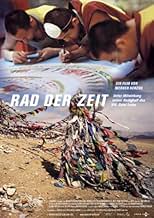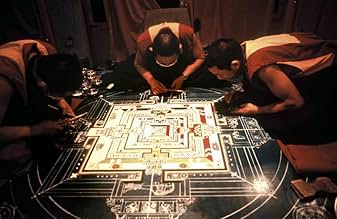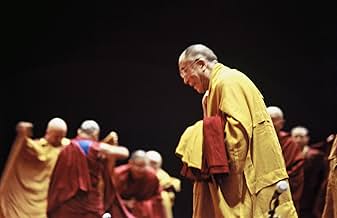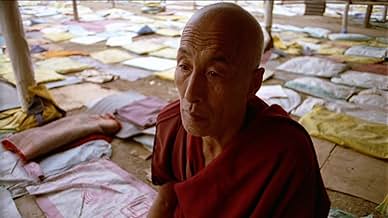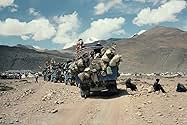IMDb RATING
7.1/10
2.8K
YOUR RATING
Wheel of Time is Werner Herzog's photographed look at the largest Buddhist ritual in Bodh Gaya, India.Wheel of Time is Werner Herzog's photographed look at the largest Buddhist ritual in Bodh Gaya, India.Wheel of Time is Werner Herzog's photographed look at the largest Buddhist ritual in Bodh Gaya, India.
- Director
- Writer
- All cast & crew
- Production, box office & more at IMDbPro
Featured reviews
Wheel of Time is a curious documentary crucially because of someone from the West, like myself, being privy to traditional customs and ceremonial practices that seem like they could be coming from another world. But, as one soon learns, this curiosity is strong because it IS apart of this world, and maybe the truest moment of clarity from the Dalai Lama himself comes when he states how the universe is really not owned by one country or apart of one mountain or other, but is in how an individual conceives it- the universe, the center of it, is in you, or at least your projection of what it is, which is not something collective but ultimately is. It's a very wise statement that will keep me pondering it over for a long time. Likewise, the Kalachakra mandala becomes like a metaphor for this ideal, of hundreds of thousands of people coming together for the purpose of- aside from getting priceless words from the Dalai Lama- being at inner peace with oneself, hence the universe.
By the end of Wheel of Time I didn't know much more about Buddhism than I had going into it, which isn't any real fault on Herzog's end as a filmmaker; it doesn't illuminate and challenge the mind too much like other documentaries of the filmmaker, but it's also nevertheless unique in Herzog's cannon for what he does and doesn't take on with his subject(s). On the one hand, he's endlessly fascinated with ritual, with physical movements, of the masses of people who have gone on this pilgrimage from thousands of miles from all over the continent for this once-in-two-years event (this adds a dosage of climactic irony for what happens there- an 'illness'). It's anthropological to an extent, only it's not one of everyday culture so much as the unheeding devotion to a religion based around enlightenment, not suffering via a messiah or other. On the other hand, Herzog relies this time on just being a guy with a camera, moving around these swarms of people, and this time Herzog relents for the most part to "directing landscapes" as he usually does to just catching people's faces, their body language, and the instruments at their disposal (which are, usually, their own bodies, as in their bowing-type moves to attain a level, and crawling on ones hands and face across land for a purpose). It's actually, for Herzog, kind of conventional, bordering on being something one might expect for television.
But this little note shouldn't discourage one from seeing the film, and whether you're a Buddhist or not it holds its own aura that provides moments almost akin to what the Dalai Lama wants for his pupils and followers. One's even reminded of Woodstock in comparison of a documentary that goes out of its way to show more-so the nature of the people who gather together, and the power of a gathering, than the actual acts themselves. On top of this, Herzog does the occasional focus on an individual (albeit a little sidetracked as it is during the climax) with a political prisoner released from China and allowed to finally "see" the Dalai Lama in person. And for Herzog fans who are always on the prowl for his 'adequate images', there's still a good few to go around here, like when he captures the mountains that the Tibetans go to in masses, or the final images, including one that is as haunting as anything Herzog's shot. It's a peaceful, brisk journey; not a great work, but not an insignificant one either.
By the end of Wheel of Time I didn't know much more about Buddhism than I had going into it, which isn't any real fault on Herzog's end as a filmmaker; it doesn't illuminate and challenge the mind too much like other documentaries of the filmmaker, but it's also nevertheless unique in Herzog's cannon for what he does and doesn't take on with his subject(s). On the one hand, he's endlessly fascinated with ritual, with physical movements, of the masses of people who have gone on this pilgrimage from thousands of miles from all over the continent for this once-in-two-years event (this adds a dosage of climactic irony for what happens there- an 'illness'). It's anthropological to an extent, only it's not one of everyday culture so much as the unheeding devotion to a religion based around enlightenment, not suffering via a messiah or other. On the other hand, Herzog relies this time on just being a guy with a camera, moving around these swarms of people, and this time Herzog relents for the most part to "directing landscapes" as he usually does to just catching people's faces, their body language, and the instruments at their disposal (which are, usually, their own bodies, as in their bowing-type moves to attain a level, and crawling on ones hands and face across land for a purpose). It's actually, for Herzog, kind of conventional, bordering on being something one might expect for television.
But this little note shouldn't discourage one from seeing the film, and whether you're a Buddhist or not it holds its own aura that provides moments almost akin to what the Dalai Lama wants for his pupils and followers. One's even reminded of Woodstock in comparison of a documentary that goes out of its way to show more-so the nature of the people who gather together, and the power of a gathering, than the actual acts themselves. On top of this, Herzog does the occasional focus on an individual (albeit a little sidetracked as it is during the climax) with a political prisoner released from China and allowed to finally "see" the Dalai Lama in person. And for Herzog fans who are always on the prowl for his 'adequate images', there's still a good few to go around here, like when he captures the mountains that the Tibetans go to in masses, or the final images, including one that is as haunting as anything Herzog's shot. It's a peaceful, brisk journey; not a great work, but not an insignificant one either.
It's interesting to read that Werner Herzog wasn't an expert on Buddhism when he filmed this. In a way, that's the charm of this film. Essentially we're given a backstage pass to a Buddhist festival. In Herzog fashion, he holds the camera longer than most, filming his subjects looking for any reaction. In a childlike way, it could be very compelling. Especially since this world is so strange to most westerners that the audience is like any tourists in a strange land. We stare a little too long.
My only complaint is he ended the movie in the wrong place. Just because The Dalai Lama couldn't finish the rituals doesn't mean the movie needs to go to another continent to find a happy ending.
My only complaint is he ended the movie in the wrong place. Just because The Dalai Lama couldn't finish the rituals doesn't mean the movie needs to go to another continent to find a happy ending.
Werner Herzog's documentaries aren't like the documentaries of anyone else. Perhaps the best documentaries are unique to the people who make them. You can tell a Flaherty from a Wiseman just as you can tell a Maysles Brothers from a Herzog. Werner is interested in extremes, if only the extremes in subject matter. He will go out of his way to show us places and things other film-makers often ignore. "Wheel of Time" is his film about a place and an event not usually seen here in the West.
Its subject is a Buddhist initiation rite performed by His Holiness the Dalai Lama and attended by over half a million pilgrims. It's a ceremony of such complexity that Herzog's capturing of it is something of a miracle in itself and, of course, it is a thing of consumate beauty. This is what religion should be but very seldom is and Herzog is a masterful observer. He also narrates the film, informing us about what is happening when we need to know but most of the time simply showing us events as they unfold. Wonderful cinema and one of Herzog's best films.
Its subject is a Buddhist initiation rite performed by His Holiness the Dalai Lama and attended by over half a million pilgrims. It's a ceremony of such complexity that Herzog's capturing of it is something of a miracle in itself and, of course, it is a thing of consumate beauty. This is what religion should be but very seldom is and Herzog is a masterful observer. He also narrates the film, informing us about what is happening when we need to know but most of the time simply showing us events as they unfold. Wonderful cinema and one of Herzog's best films.
This is the story of the Buddhist initiation ceremonies held in 2002 in India and in Austria during which elaborate sand mandalas (the Wheel of Time of the title) were created. In India we see how half a million pilgrims come from what ever means was at their disposal to come and see the Dalai Lama and be blessed, while in Austria a few thousand people attended the ceremonies.
Difficult to adequately explain fully, the film, part document of the events, part meditation on them and on larger ideas. It is a film that beautifully shows how one religion can transcend place and time. It attempts to show us the length to which the pilgrims will go in order to travel down the path to enlightenment. Since this is a trip that is only really traveled deep inside oneself Werner Herzog keeps his camera ever moving over the landscape of the people who are trying to find nirvana. We are forever looking at the faces of those deep in prayer and meditation as if we might be able to find some clue as to what is going on deep with in each persons soul. It becomes a mediation on meditation.
For the most part this film works wonderfully. It manages to give some clue into the very nature of what the ceremonies are all about. We are also drawn into a contemplative and meditative state that seems akin or to approximate those of some of the pilgrims. While certainly not the real thing it is enough to give one a feel for deep thought.
I do have one problem with the film, and its a minor one, in the central section the film seems to wander about too much with some of the pilgrims. Its a personal thing but I was not as enthralled with the journey to the sacred mountain, and I did get a bit tired of prostrating monks. Its a minor thing, but it decreased my enjoyment of the film ever so slightly.
Still this is good film that is a must see for anyone who is interested in Buddhism or the varieties of religious experience. For those who want to see a slice of life thats not in their neighborhood, I also recommend it. 7 out of 10 because the reaction to it will as varied as the audience.
Difficult to adequately explain fully, the film, part document of the events, part meditation on them and on larger ideas. It is a film that beautifully shows how one religion can transcend place and time. It attempts to show us the length to which the pilgrims will go in order to travel down the path to enlightenment. Since this is a trip that is only really traveled deep inside oneself Werner Herzog keeps his camera ever moving over the landscape of the people who are trying to find nirvana. We are forever looking at the faces of those deep in prayer and meditation as if we might be able to find some clue as to what is going on deep with in each persons soul. It becomes a mediation on meditation.
For the most part this film works wonderfully. It manages to give some clue into the very nature of what the ceremonies are all about. We are also drawn into a contemplative and meditative state that seems akin or to approximate those of some of the pilgrims. While certainly not the real thing it is enough to give one a feel for deep thought.
I do have one problem with the film, and its a minor one, in the central section the film seems to wander about too much with some of the pilgrims. Its a personal thing but I was not as enthralled with the journey to the sacred mountain, and I did get a bit tired of prostrating monks. Its a minor thing, but it decreased my enjoyment of the film ever so slightly.
Still this is good film that is a must see for anyone who is interested in Buddhism or the varieties of religious experience. For those who want to see a slice of life thats not in their neighborhood, I also recommend it. 7 out of 10 because the reaction to it will as varied as the audience.
Werner Herzog again.
This time he is in his mode of creation more by discovery than invention, and it pays off.
The raw material is striking by itself: vast numbers, ephemeral yearnings, trivial and essential rituals. Devotion in any endeavor is something we are drawn to, and there is plenty for our filmmaker to harvest.
The essential part of this film is Herzog as camera during a gathering in India, where a variety of consecrations are planned. Monks and devotees come, some by difficult and humbling means. 400,000 faces (all attempting calmness) are miraculously organized, assembled to be led by the supreme priest.
We see queues so orderly they could only exist among such beings, but anxious chaos when fighting for tossed goodies: dumplings and candies. We have zealots, order and peace.
Into this sails Herzog. The story is that he had been cajoled into filming the much smaller gathering in Austria. Austria! He was reluctant to do so, and after the film remains firm in his belief that Austrian Buddhists don't make much sense to him. But with this commitment, he traveled to the gathering in a sacred place in India near Nepal.
There he found a focus for his film in one of the rituals. Though it is presented as central to the gathering, it is only so in Herzog's vision. This holds that mysteries can be conveyed visually. The situation needs to support the vision, but the vision is the thing. It is not the symbol, the notation, the token, but the real thing. This is how he thinks of cinema and the way he presents the sand mandala carries this import.
The "Wheel of Time" is one translation of a sand painting made for this type of gathering, as perfected and maintained by one of the groups in Tibet. Mandalas are movies and intended for meditation, as a structure existing between and shared by the mind of insight and the real world of color and structure. There is much to be said of them and cinema, but Herzog only could film this one (and its copy in Austria) as it is being made with colored sand and exhibited as devotees are rushed past it.
He then went to Mount Kailash, Though this is a couple hundred miles away, he merges it seamlessly into the gathering of nearly half a million robed prayers. Here, he is able to make some magnificent images of the mountain, its waterways and the people ritualistically circumnavigating it. This is holiness he understands and the conflation of mountain and mandala works.
As usual, the music adds great power. I believe that henceforth, I will associate that music with this devotion, though there is no relation other than Herzog chose to build his mandala of these sounds, this extract of natural rock and water, and these people. They would not recognize their devotions as shown here. (And some of this is staged.) But for me, it is a window into something more holy than they worship.
Ted's Evaluation -- 3 of 3: Worth watching.
This time he is in his mode of creation more by discovery than invention, and it pays off.
The raw material is striking by itself: vast numbers, ephemeral yearnings, trivial and essential rituals. Devotion in any endeavor is something we are drawn to, and there is plenty for our filmmaker to harvest.
The essential part of this film is Herzog as camera during a gathering in India, where a variety of consecrations are planned. Monks and devotees come, some by difficult and humbling means. 400,000 faces (all attempting calmness) are miraculously organized, assembled to be led by the supreme priest.
We see queues so orderly they could only exist among such beings, but anxious chaos when fighting for tossed goodies: dumplings and candies. We have zealots, order and peace.
Into this sails Herzog. The story is that he had been cajoled into filming the much smaller gathering in Austria. Austria! He was reluctant to do so, and after the film remains firm in his belief that Austrian Buddhists don't make much sense to him. But with this commitment, he traveled to the gathering in a sacred place in India near Nepal.
There he found a focus for his film in one of the rituals. Though it is presented as central to the gathering, it is only so in Herzog's vision. This holds that mysteries can be conveyed visually. The situation needs to support the vision, but the vision is the thing. It is not the symbol, the notation, the token, but the real thing. This is how he thinks of cinema and the way he presents the sand mandala carries this import.
The "Wheel of Time" is one translation of a sand painting made for this type of gathering, as perfected and maintained by one of the groups in Tibet. Mandalas are movies and intended for meditation, as a structure existing between and shared by the mind of insight and the real world of color and structure. There is much to be said of them and cinema, but Herzog only could film this one (and its copy in Austria) as it is being made with colored sand and exhibited as devotees are rushed past it.
He then went to Mount Kailash, Though this is a couple hundred miles away, he merges it seamlessly into the gathering of nearly half a million robed prayers. Here, he is able to make some magnificent images of the mountain, its waterways and the people ritualistically circumnavigating it. This is holiness he understands and the conflation of mountain and mandala works.
As usual, the music adds great power. I believe that henceforth, I will associate that music with this devotion, though there is no relation other than Herzog chose to build his mandala of these sounds, this extract of natural rock and water, and these people. They would not recognize their devotions as shown here. (And some of this is staged.) But for me, it is a window into something more holy than they worship.
Ted's Evaluation -- 3 of 3: Worth watching.
Did you know
- Quotes
The Dalai Lama: All religions carry same message. Message of love, compassion, forgiveness, tolerance, contentment, self-discipline. I think we need these qualities, irrespective of whether we are believer or non-believer, because these are the source of a happy life.
- SoundtracksHimal
Performed by Prem Rama Autari
- How long is Wheel of Time?Powered by Alexa
Details
Contribute to this page
Suggest an edit or add missing content

